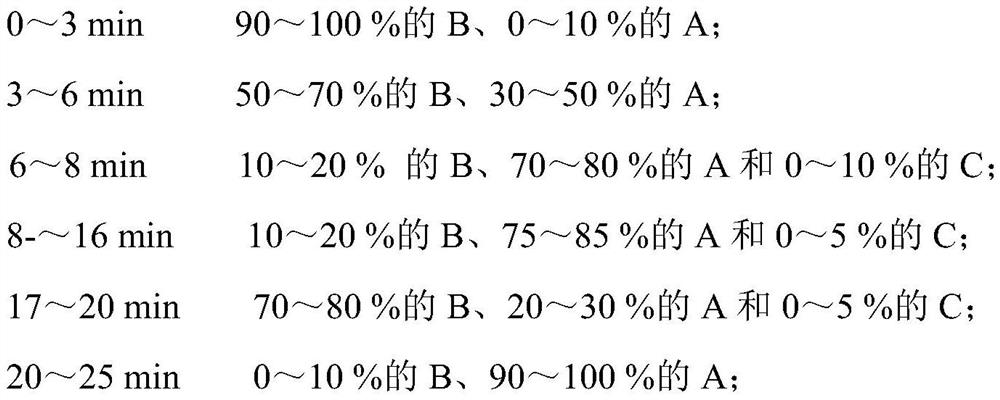A method for analyzing residual veterinary drugs in mutton
A technology for mutton and veterinary drugs, applied in analytical materials, material separation, instruments, etc., can solve the problems of high detection limit and quantification limit, high cost, affecting test results, etc., and achieve high accuracy and purification effect. and low limits of quantitation, high sensitivity and precision
- Summary
- Abstract
- Description
- Claims
- Application Information
AI Technical Summary
Problems solved by technology
Method used
Image
Examples
Embodiment 1
[0081] Embodiment 1 provides a kind of method for analyzing residual veterinary drug in mutton, comprises the steps:
[0082] (1) mince the mutton sample and homogenize it in a homogenizer;
[0083] (2) Weigh 5.00g of homogenized mutton sample into a 50ml centrifuge tube, add 10ml of 0.2mol / L sodium acetate buffer solution, and add acetic acid to adjust the pH value to 5, mix well; then add 0.1ml of the same amount of β-glucuronidase and arylsulfatase, shake and mix well, then hydrolyze in a constant temperature water bath at 35°C for 12 hours, centrifuge at 4000 rpm for 5min, transfer the separated supernatant to a 50ml centrifuge tube; centrifuge Add 5ml of formic acid to the final residue, vortex on a vortex mixer for 2min, centrifuge at 4000 rpm for 5min, and combine with the obtained supernatant;
[0084] (3) Add perchloric acid to the obtained supernatant to adjust the pH value to 0.5, mix evenly for 10 minutes, then concentrate the obtained supernatant after centrifugi...
Embodiment 2
[0111] Embodiment 2 provides a kind of method for analyzing residual veterinary drug in mutton, comprises the steps:
[0112] (1) mince the mutton sample and homogenize it in a homogenizer;
[0113] (2) Weigh 5.00g of homogenized mutton sample into a 50ml centrifuge tube, add 10ml of 0.2mol / L sodium acetate buffer solution, and add acetic acid to adjust the pH value to 5.2, mix well; then add 0.1ml of the same amount of For β-glucuronidase and arylsulfatase, oscillate and mix evenly, then hydrolyze in a constant temperature water bath at 37°C for 24 hours, centrifuge at 4000 rpm for 5min, and transfer the separated supernatant to a 50ml centrifuge tube; centrifuge Add 5ml of formic acid to the final residue, vortex on a vortex mixer for 2min, centrifuge at 4000 rpm for 5min, and combine with the obtained supernatant;
[0114] (3) Add perchloric acid to the obtained supernatant to adjust the pH value to 1.2, mix evenly for 15 minutes, then concentrate the obtained supernatant ...
Embodiment 3
[0139] Embodiment 3 provides a kind of method for analyzing residual veterinary drug in mutton, and difference with embodiment 2 is that the extraction agent extraction process described in the (4) step adopts gradient extraction method, comprises the following steps;
[0140] A) To adjust the pH value to 11, and add salting-out agent centrifugation, add 10ml equivalent formic acid and dimethyl sulfoxide to the supernatant, homogenize for 30min, centrifuge, filter to get the supernatant; for centrifugation The resulting sample residue was extracted 3 times according to this procedure, and the obtained supernatants were combined and blended to obtain X 1 Extraction solution;
[0141] B) The X obtained in step A 1 Concentrate the extract and transfer it to a 50ml centrifuge tube, add 10ml of acetonitrile, homogenize for 30min, centrifuge, filter to get the supernatant; repeat the extraction of the sample residue obtained by centrifugation three times according to this step, and...
PUM
 Login to View More
Login to View More Abstract
Description
Claims
Application Information
 Login to View More
Login to View More - R&D
- Intellectual Property
- Life Sciences
- Materials
- Tech Scout
- Unparalleled Data Quality
- Higher Quality Content
- 60% Fewer Hallucinations
Browse by: Latest US Patents, China's latest patents, Technical Efficacy Thesaurus, Application Domain, Technology Topic, Popular Technical Reports.
© 2025 PatSnap. All rights reserved.Legal|Privacy policy|Modern Slavery Act Transparency Statement|Sitemap|About US| Contact US: help@patsnap.com

